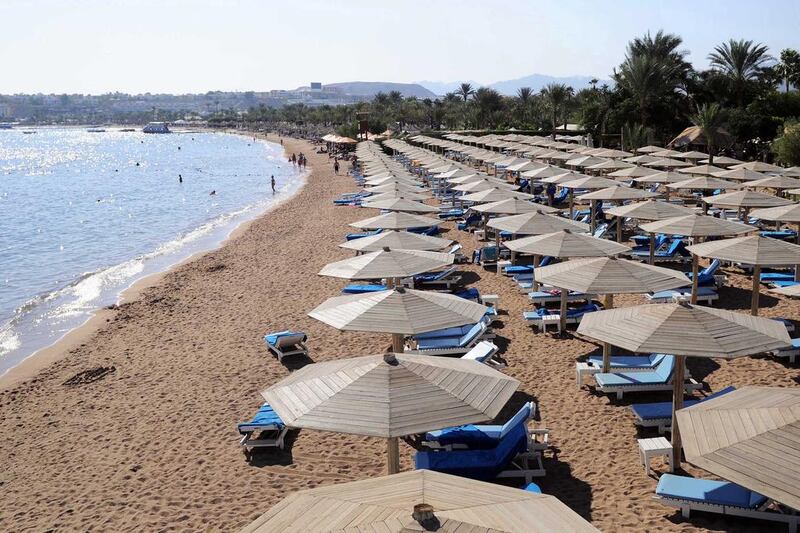Whatever results emerge from the investigations of the Sharm El Sheikh airplane disaster, Egypt needs to take emergency measures to salvage what remains of the winter 2015-16 tourist season.
Much of the world now believes that the crash of the Russian airplane on October 31, killing all 224 people on board, was caused by a bomb planted shortly before it took off from Sharm El Sheikh airport. Whether this is true hardly matters for the economy, at least in the short term. The Egypt brand has been severely damaged, and the vital tourism industry is in crisis.
Lessons can be learnt from how others have dealt with disasters. One of the most famous examples of crisis management is that of the American company Johnson & Johnson, whose medicine Tylenol had a 35 per cent share of the US painkiller market. In 1982, someone laced several of its bottles with cyanide, killing seven people. Sales plummeted.
But within days, Johnson & Johnson jumped into action. At huge expense, it recalled Tylenol from every outlet throughout the US and replaced the product with packages that were tamper-proof, making it much more difficult for a similar incident to recur. Within five months, it had recovered nearly all of its market share.
Some people were so impressed with the company’s concern for customers’ safety, it is said, that they switched to Tylenol from other brands.
__________
Egypt tourism
■ Mixed views over plane crash's impact on Egyptian tourism. Read here
__________
There is little doubt that the Egypt brand is similarly in danger, with disastrous consequences for Egyptians. Dramatic action is needed.
Tourism has traditionally accounted for about 10 per cent of Egypt's total employment. The International Business Times news site quoted Mohamed Yousef, an adviser to the tourism minister, as saying the fallout from the disaster could cost the industry about 70 per cent of its visitors.
Of the 9.9 million tourists who visited last year, almost 3 million were from Russia, the single biggest group of visitors to Egypt, according to Bloomberg. Last week Russia suspended all flights to Egypt out of safety concerns. The United Kingdom, which sends 1 million tourists a year, has stopped all flights to Sharm El Sheikh at least until November 25.
First on Egypt’s agenda needs to be a complete public review and total shake-up of airport security, even if the cause of the disaster turns out to be technical and not sabotage.
Ayman Ashour, who in the late 1990s was managing director for Asian operations at the security firm Williams PLC, suggests the government might take a cue from US actions after the September 11, 2001, attacks in America, where all civilian flights were cancelled nationwide for 48 hours, security procedures were tightened dramatically and funds were thrown into expanding the number of staff and increasing training.
Long queues formed at US airports in the following months, causing huge inconvenience, but the message was delivered to a worried public that it was once again safe to travel.
For Egypt, Mr Ashour also suggests that in addition to tighter procedures, pro-government Bedouin – who intimately understand the culture of the Sinai region – might be employed to help in the security effort.
The second priority is to let people know that vigorous steps have been taken to ensure their security, partly with the help of the governments of the countries who supply the tourists.
This has happened to some extent already. Russia this week sent two groups of aviation experts to audit security at Egypt’s main airports. They will need at least two weeks to determine whether flights can resume, the deputy head of Russia’s tourist operators association was quoted as saying on Monday.
Egypt needs to quickly regain control of the narrative. News of the investigation should not be coming out by way of foreign newspaper leaks. A useful beginning might be to hold a daily news briefing by the Egyptian head of the investigative commission, attended as well by Russian and French experts.
The public perception abroad, whether deserved or not, is that Egypt is being less than transparent, and that it is trying to prevent crucial facts from emerging lest they embarrass the government.
Once confidence is restored, the final step of luring tourists back to Sinai should be relatively easy. There are few destinations so close to the wealthy markets of Europe that can guarantee year-round sun and sand. One way might be to harness the clever new generation of Egyptian bloggers who cut their teeth during the past five years of political turmoil to make the charm of Sharm go viral on social media.
Patrick Werr has worked as a financial writer in Egypt for 25 years.
business@thenational.ae
Follow The National's Business section on Twitter





